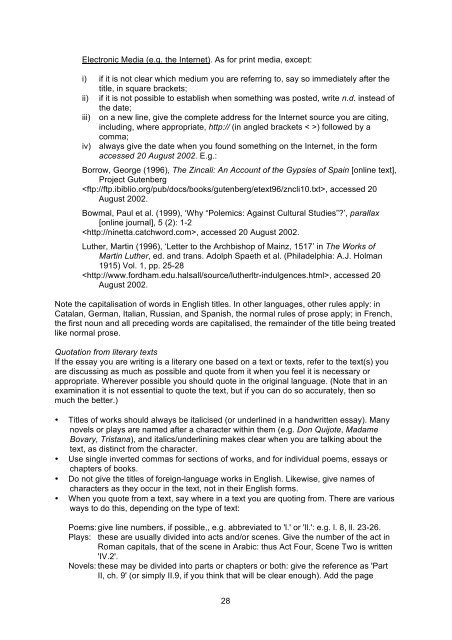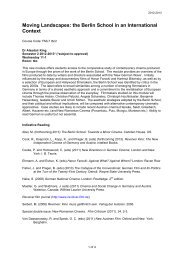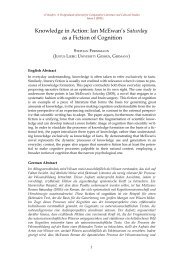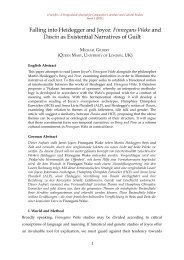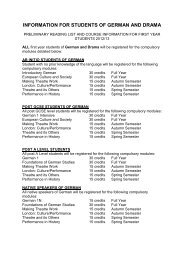Student Handbook - The School of Language, Linguistics and Film
Student Handbook - The School of Language, Linguistics and Film
Student Handbook - The School of Language, Linguistics and Film
Create successful ePaper yourself
Turn your PDF publications into a flip-book with our unique Google optimized e-Paper software.
Electronic Media (e.g. the Internet). As for print media, except:<br />
i) if it is not clear which medium you are referring to, say so immediately after the<br />
title, in square brackets;<br />
ii) if it is not possible to establish when something was posted, write n.d. instead <strong>of</strong><br />
the date;<br />
iii) on a new line, give the complete address for the Internet source you are citing,<br />
including, where appropriate, http:// (in angled brackets < >) followed by a<br />
comma;<br />
iv) always give the date when you found something on the Internet, in the form<br />
accessed 20 August 2002. E.g.:<br />
Borrow, George (1996), <strong>The</strong> Zincali: An Account <strong>of</strong> the Gypsies <strong>of</strong> Spain [online text],<br />
Project Gutenberg<br />
, accessed 20<br />
August 2002.<br />
Bowmal, Paul et al. (1999), ‘Why “Polemics: Against Cultural Studies”?’, parallax<br />
[online journal], 5 (2): 1-2<br />
, accessed 20 August 2002.<br />
Luther, Martin (1996), ‘Letter to the Archbishop <strong>of</strong> Mainz, 1517’ in <strong>The</strong> Works <strong>of</strong><br />
Martin Luther, ed. <strong>and</strong> trans. Adolph Spaeth et al. (Philadelphia: A.J. Holman<br />
1915) Vol. 1, pp. 25-28<br />
, accessed 20<br />
August 2002.<br />
Note the capitalisation <strong>of</strong> words in English titles. In other languages, other rules apply: in<br />
Catalan, German, Italian, Russian, <strong>and</strong> Spanish, the normal rules <strong>of</strong> prose apply; in French,<br />
the first noun <strong>and</strong> all preceding words are capitalised, the remainder <strong>of</strong> the title being treated<br />
like normal prose.<br />
Quotation from literary texts<br />
If the essay you are writing is a literary one based on a text or texts, refer to the text(s) you<br />
are discussing as much as possible <strong>and</strong> quote from it when you feel it is necessary or<br />
appropriate. Wherever possible you should quote in the original language. (Note that in an<br />
examination it is not essential to quote the text, but if you can do so accurately, then so<br />
much the better.)<br />
• Titles <strong>of</strong> works should always be italicised (or underlined in a h<strong>and</strong>written essay). Many<br />
novels or plays are named after a character within them (e.g. Don Quijote, Madame<br />
Bovary, Tristana), <strong>and</strong> italics/underlining makes clear when you are talking about the<br />
text, as distinct from the character.<br />
• Use single inverted commas for sections <strong>of</strong> works, <strong>and</strong> for individual poems, essays or<br />
chapters <strong>of</strong> books.<br />
• Do not give the titles <strong>of</strong> foreign-language works in English. Likewise, give names <strong>of</strong><br />
characters as they occur in the text, not in their English forms.<br />
• When you quote from a text, say where in a text you are quoting from. <strong>The</strong>re are various<br />
ways to do this, depending on the type <strong>of</strong> text:<br />
Poems: give line numbers, if possible,, e.g. abbreviated to 'l.' or 'll.': e.g. l. 8, ll. 23-26.<br />
Plays: these are usually divided into acts <strong>and</strong>/or scenes. Give the number <strong>of</strong> the act in<br />
Roman capitals, that <strong>of</strong> the scene in Arabic: thus Act Four, Scene Two is written<br />
'IV.2'.<br />
Novels: these may be divided into parts or chapters or both: give the reference as 'Part<br />
II, ch. 9' (or simply II.9, if you think that will be clear enough). Add the page<br />
28


